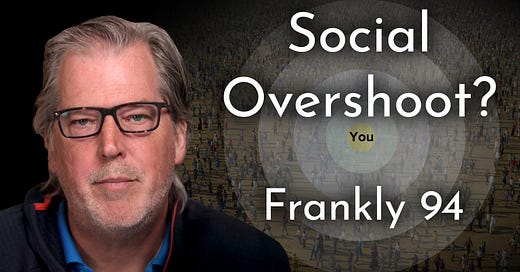With more people on the planet than ever before – with most having constant digital access to one another – there is an abundance of potential relationships available to us. Despite this, there is also an increasing loneliness crisis across global society. What can evolutionary psychology teach us about this lack of meaningful relationships at a time of hyper-connectivity?
In this week’s Frankly, I reflect on the effects of technology on modern relationships, and how Dunbar’s number infers a ceiling on the number of people we can meaningfully interact with. I emphasize the rare value of full attention in close relationships, and the implications of our current social dynamics as we face more turbulent times and a smaller world ahead.
What are the negative effects of overextending our social networks and how does that shape the way we build community? How can we foster and strengthen connections with the people who are most important to us? Finally, what will our networks look like when the economic music speeds up or stops, and those who are closest to us become our most important support systems?
In case you missed it…
This, I was joined by Pedro Prieto to discuss the recent blackout in the Iberian Peninsula, exploring its causes, impacts, and the role of renewable energy in the stability of the electric grid. Prieto highlighted the societal and infrastructural challenges that his home country faced, emphasizing the need for a balanced approach to energy management, as well as the interconnectedness of energy systems and societal resilience. The discussion delved into the complexities of energy demand and supply, the importance of backup systems, and the future of renewable energy in Spain.
If you appreciate The Great Simplification podcast…
Be sure to leave a review on your preferred podcast platform! Leaving reviews helps the podcast grow, which helps spread awareness of our systemic situation from experts in ecology, energy, policy, economics, technology, and community building so that we can better understand - and respond to - the challenges of the coming decade.
The Great Simplification podcast is produced by The Institute for the Study of Energy and Our Future (ISEOF), a 501(c)(3) organization. We want to keep all content completely free to view globally and without ads. If you’d like to support ISEOF and its content via donation, please use the link below.






Three relevant book (and possibly guest) recommendations I believe TGS viewers will be inspired by:
1. "The Sirens' Call; How Attention Became the World's Most Endangered Resource" by Chris Hayes, 2025. "Something has changed utterly... attention has become a commodified resource extracted from us, and from which we are increasingly alienated...'Now our deepest neurological structures, human evolutionary inheritances, and social impulses are in a habitat designed to prey upon, to cultivate, distort, or destroy that which most fundamentally makes us human.'...we can wrest back control of our lives, our politics, and our future" (cover).
2. Although the intended audience is women, I believe this book would benefit any reader since it draws strongly upon sensory experiencing modalities, as well as discusses not only personal, but also collective healing: "Call of the Wild; How We Heal Trauma, Awaken Our Power, and Use It for Good" by Kimberly Ann Johnson, 2021. "In an increasingly polarized world where trauma is often publicly renegotiated, our nervous systems are on high alert...[We live] In a culture that prioritizes executive function and 'mind over matter'...While we cannot cure the painful cultural rifts inflicting our society, there is a path forward--through our bodies " (cover).
3. "The Connection Cure; The Prescriptive Power of Movement, Nature, Art, Service, and Belonging" by Julia Hotz, 2024. "Science shows that social prescribing is effective for treating symptoms of the modern world's most common ailments...As Hotz tours the globe to investigate the spread of social prescribing to more than thirty countries, she meets people personifying its evolutionary potential... The success stories she finds bring a long-known theory to life: if we can change our environment, we can change our health. By reconnecting to what matters to us, we can all start to feel better" (cover).
(Cross-posted to YouTube)
Will watch your latest today. Just wanted to let you know Paul Hawken was on Rich Roll's show and mentioned your work at The Great Simplification. If you reading this don't know Rich, he is a plant strong athletic buddha who is always learning. https://www.youtube.com/watch?v=j8wSvRZo2cM